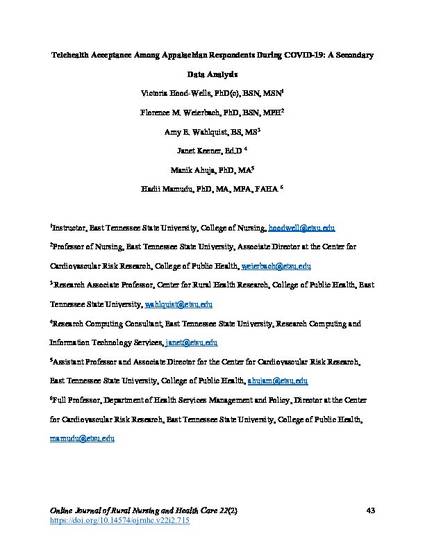
Purpose: The purpose of this study is to examine the relationship between telehealth use, telehealth satisfaction, and chronic medical conditions among residents living in Appalachian and non-Appalachian communities.
Sample: A COVID-19 public health survey was distributed via social media and healthcare clinics in the tri-state region of central Appalachia. Survey responses were limited to adults aged ≥18 years who consented to participate in the survey that self-identified as an individual with one or more chronic medical conditions (n=195).
Method: Simple descriptive statistics including frequencies, percentages, means, and standard deviations (SDs) were calculated for variables of interest both overall and by subgroups of interest. Chi-squared tests were used to compare categorical outcomes between groups of interest, while two-sample t-tests were used for continuous outcomes. Significance for all tests was determined using an α level of 0.05.
Findings: There is no statistically significant relationship between respondents with regard to using telehealth services, satisfaction rates related to telehealth use, or reasons for electing not to use telehealth services during the COVID-19 pandemic. However, there was a trending statistical relationship between county status and the use of telehealth services in Appalachia with those counties doing economically better being more likely to use telehealth services as compared to those fairing less well (p=0.053). Findings also suggest that people living in urban areas of Appalachia were more likely to be satisfied using telehealth services than those living in non-urban areas of Appalachia (p=0.01).
Conclusions: Research is still limited as to how the expansion of broadband capabilities during the COVID-19 pandemic has benefited those residing in Appalachia in terms of managing chronic health conditions. Future research should focus on expanding participation among Appalachian respondents looking for specific differences related to location within Appalachia, age, gender, ethnicity, and socioeconomic status.
Available at: http://works.bepress.com/florence-weierbach/69/

Authors retain copyright and grant the journal right of first publication with the work simultaneously licensed under a Creative Commons Attribution License that allows others to share (for non-commerical purposes) the work with an acknowledgement of the work's authorship and initial publication in the original journal.
Authors are able to enter into separate, additional contractual arrangements for the non-exclusive distribution of the journal's published version of the work (e.g., post it to an institutional repository or publish it in a book), with an acknowledgement of its initial publication in the original journal.
This article was originally published in the Online Journal of Rural Nursing and Health Care.